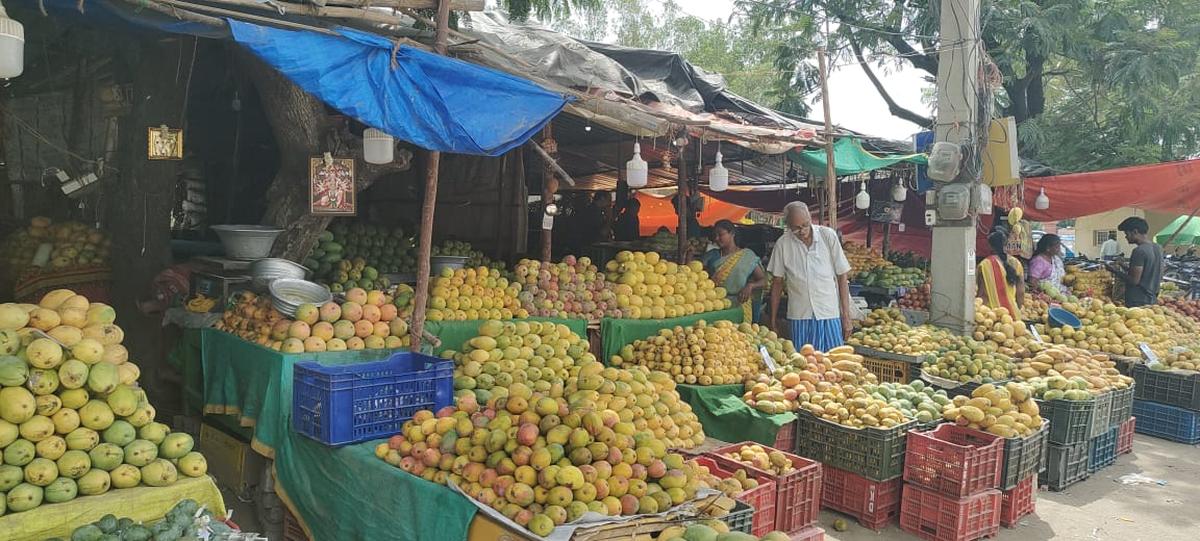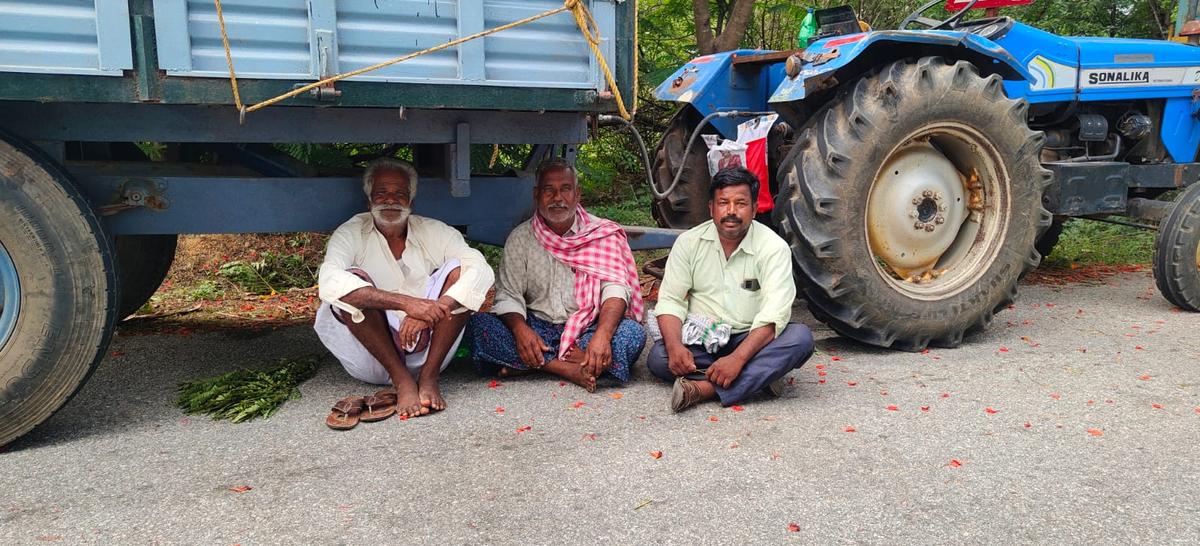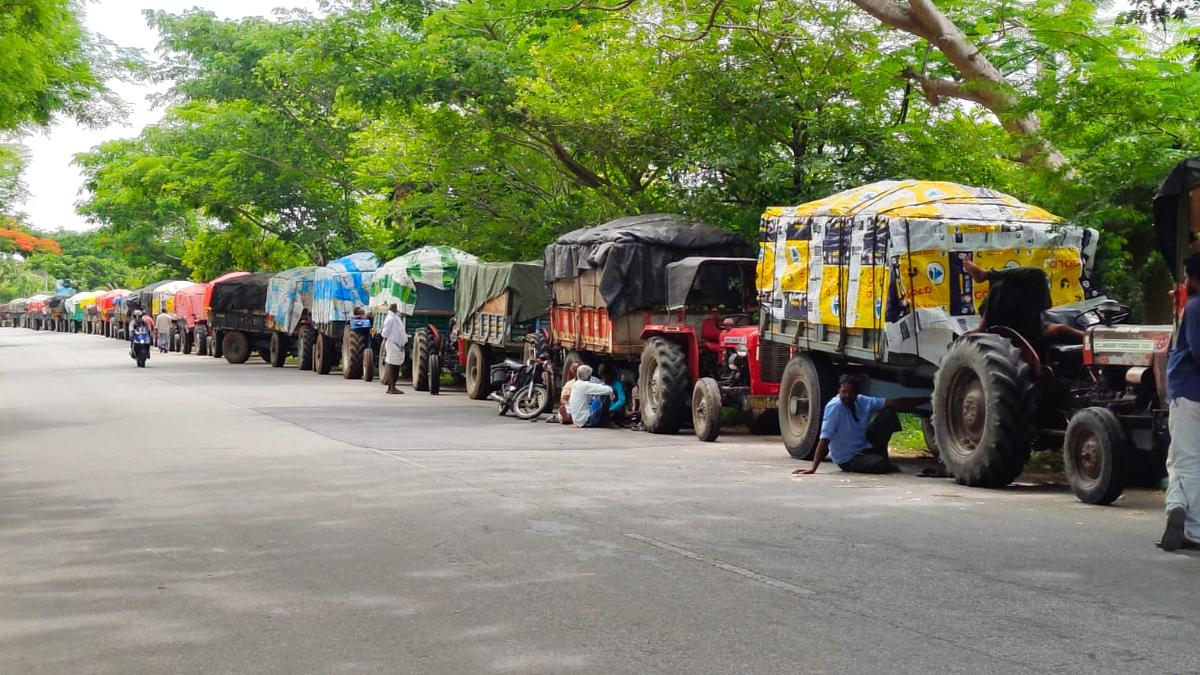When a middleman told Rajendra, a young mango farmer from Yadamarri mandal near Chittoor, that he could take his ‘totapuri’ mango stocks to an MNC pulp-making centre, he thanked his lucky stars. He had been trying to find takers for the produce from his modest 30 acre mango orchard on the Gudiyattam Road for quite some time and was worried his fruits might rot on the orchard itself.
Rajendra swiftly arranged for the labour to harvest and load six tonnes of his best mangoes. He could only pay part of the wages then, but promised the workers that he would pay balance amount after selling the produce. On June 12, he set out to the procurement centre located on the Chittoor-Puttur highway 30 km away, certain that ‘one of India’s largest pulp-making units’ would take his produce.
But as his tractor-trailer approached the unit, he began to notice trailers laden with mangoes parked on either side of the highway. Not one or two, around 30 of them. Rajendra’s heart sank, for he knew what that meant: a queue, stretching for over two kilometres, and he was at the very end of it.

Public response to mangoes has been limited this season, say traders.
“You have to take a token, and the procurement will be in the last week of June,” Rajendra was told at the factory gate. The worry returned, but this time there was no hope. He cannot take the produce back and store it for weeks. He had to sell them that day itself or ran the risk of incurring total loss.
Rajendra, who had spent ₹15 lakh on his orchard this season, was one of the 3.5 lakh active mango growers in the combined Chittoor district who believed in the promise that mangoes would be the next agricultural gold mine, only to find a volatile business that keeps them on tenterhooks year after year.
With a leaden heart, Rajendra turned his vehicle around and headed towards Bangarupalem mango market, where he sold his best picks for a paltry sum of ₹4 a kg. “I had expected a negligible profit of ₹20,000 for this shipment, excluding the cost of cutting and transportation and the year-long maintenance. Now, I have to rethink harvesting the remaining fruits,” says Rajendra.
For farmers like Rajendra, every season is a tightrope walk over a chasm of loss. The case of Suryaprakash, another farmer from Irala mandal, is not much different. He had broken 18 coconuts at a local temple to ensure a good outcome before taking his produce to a nearby pulp unit. Everything was fine until factory management shot their price point blank: “We can’t give you more than ₹4 a kg. If you don’t want to sell it at that price, you can return.” After much pleading with the management, he settled for ₹4.5 a kg, still a far cry from the price he had expected.
Notably, the government had ordered pulp units in the State to offer farmers a minimum support price (MSP) of ₹8 a kg, on top of a subsidy of ₹4 a kg. However, even with just two weeks left of the pulp season, none of the 39 pulp units, including six belonging to MNCs, in Chittoor district has come forward to honour the order. Moreover, none of them began procurement as per schedule, from mid-May onwards; active procurement began only in mid-June, say farmers.
Between luck and ruin

Farmers resting underneath the trailer of a tractor laden with mangoes, on the outskirts of Chittoor. This queue stretched for over 2 km on both sides of the Puttur Road.
The yearly swing in mango prices is so steep that it can make or break a farmer in just a year. In 2024, totapuri yield was just 30%, which led to a high demand. Each kg was sold between ₹25 and ₹28 to the pulp units, that, too, without any government intervention. In contrast, 2025 witnessed a glut of over 75% of yield, with most fruits having developed well and being pulpy, thanks to the congenial winter and summer, sending the prices on a tailspin.
According to official statistics, in the combined Chittoor district, which includes parts of Tirupati and Annamayya districts, registered a total yield of more than 10 lakh tonnes of totapuri and alphonso varieties this year. Of this, 6.21 lakh tonnes come from the new Chittoor district. The 39 pulp units, on the other hand, has an official processing capacity of 5.65 lakh tonnes.
Till the first week of June, the farmers hoped that they would get an MSP of at least ₹20 a kg, but the district administration announced just ₹12, including the ₹4 in subsidy.
Despite assurances from Chittoor District Collector Sumit Kumar that the government would buy the entire produce and that the procurement would continue till August, the farmers remain worried, and rightly so.
“We are not talking about toys, but highly perishable goods. If the procurement goes up till August, what about the already ripe fruits about to fall? When loading is done, we have to unload the fruit within 24 hours, otherwise the stock would get damaged and would have to be thrown away,” says Janardhan, a farmer at Karveti Nagaram.
Senior mango farmer and BJP district leader Kothur Babu says they are in a dire situation. “We are headed for a disaster. The mango procurement should have begun in May. The pulp units have formed a syndicate and deliberately delayed the procurement. They know very well that the farmers would be the ultimate losers because our hopes are balanced on perishable goods,” he adds.
Mr. Babu recalled how the district administration used to deploy senior officials at the entrances of pulp units. “Not even a single tractor went inside without the knowledge of the official. The procurement was on a first-come, first-served basis. Now, an illogical token system has been introduced. A farmer who obtained a token on June 16 should visit the factory with stocks on July 3. Can the perishable goods wait that long?” he said. “Fortunately, a good number of mango farmers have their sons and daughters as IT professionals in India and abroad. But for their support, many farmers would have ended their lives by now,” he says grimly.
Madhireddy Vijaysimha Reddy, a retired tahsildar and a senior mango farmer, says that though the district administration has the power to dictate terms to the pulp industry, “it’s becoming more of a silent spectator year after year.”
The pulp units are getting several crores of rupees as a subsidy every year. “Minister for Agriculture Atchannaidu repeatedly said that the government has earmarked ₹168 crore as subsidy for mango farmers, but there is not a single word of assurance from the government that they would make the pulp industry procure the stocks at ₹8 a kg. Many pulp units are pressuring the farmers to sell their produce at ₹4 a kg,” he alleges.
War and fruit
Notably, some pulp-making units are blaming Russia-Ukraine war for the tepid procurement. K. Mani, a 62-year-old mango farmer from Palamaner mandal, says: “When I went to sell my produce a few days ago, a manager came up to me saying that owing to the Russia-Ukraine war, the mango beverage business was down and that the stocks were piled up. The manager said they were procuring the produce from us because they didn’t want to make us unhappy. I was forced to sell 10 tonnes at ₹4 a kg as against the government price of ₹8 a kg.”
Field staff of the Agriculture and Horticulture departments say this strange situation of “mango panic” exists nowhere else in the country.
The mango farmers in the Chittoor region say their counterparts in Karnataka and Tamil Nadu are willing to sell their produce at the lowest possible price. Notably, a large number of farmers from Krishnagiri district of Tamil Nadu were said to have supplied premium varieties of ‘Pulera’ and ‘Chandura’ to pulp units in Chittoor district this year, at costs ranging between ₹4 and ₹6 a kg. These two table varieties are considered superior to totapuri in taste and shelf life and are also in high demand from international clients.
According to sources, Tamil Nadu registered a bumper yield this year, and its farmers took their produce to Chittoor to sell it at whatever price offered to them by the pulp units.
A senior official from the Forest department, who sought anonymity, blamed the government for the “undue mango revolution” in Chittoor district. During the past one and a half decades, the departments of DRDA and DWMA distributed mango saplings of various varieties, particularly the totapuri and Alphonso, to farmers in Chittoor. “The officials, in most cases, are responsible for creating the impression that the mango is going to be the alpha and omega of horticulture in the future,” the official adds.
Meanwhile, the mango crisis has spurred a political reaction as well, with the YSRCP, the Left and the Congress organising protests, demanding a higher MSP for mango farmers and blaming the government for its “failure to check the of the highhandedness of the pulp industry and make them stick to the declared MSP.”
What the pulp industry says
Govardhan Bobby, chairman of All India Food Processors Association-South Zone and a representative of the Pulp Industry in Chittoor district, says mango orchards across the country witnessed a glut this season.
“An important point is that mango is a biannual crop, that is, if it’s a bumper crop this year, it will be a a poor harvest the next year. Take the example of 2024, when the yield was below 30%. In 2025, the yield is over 75%,” he says.
Also, the COVID-19 waves, the Russian-Ukraine war and the present Iran-Israel conflict in West Asia has clobbered the pulp industry in Chittoor district. It has incurred a loss of over ₹1,000 crore since 2023. Govardhan Bobby says the pulp factories currently have a combined pulp stock of 1.75 lakh tonnes in their warehouses because the buyers (those who purchase pulp from the units) did not come forward in 2023 and 2024.
After the disturbances in West Asia, the Red Sea route has been closed off or operated with limited schedules. Owing to this, the exporters have to depend on circuitous routes, passing around Sri Lanka and South East Asian countries. “This is eight times costlier compared to the Red Sea route.”
Despite no demand from buyers, due to pressure from the government, we are purchasing the stocks from farmers at ₹5 or ₹6 a kg. In Tamil Nadu, the pulp industry pays just ₹3 a kg, while in Karnataka, it’s just ₹2,” he adds.



